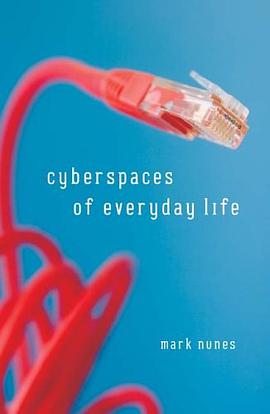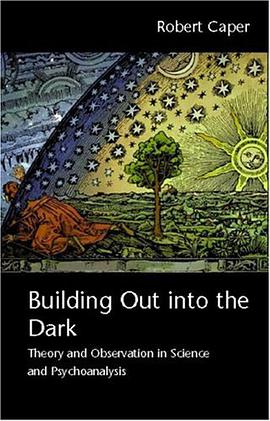

具体描述
Networks and computer-mediated communication now penetrate the spaces of everyday life at a fundamental level. We communicate, work, bank, date, check the weather, and fuel conspiracy theories online. In each instance, users interact with network technology as much more than a computational device. "Cyberspaces of Everyday Life" provides a critical framework for understanding how the Internet takes part in the production of social space. Mark Nunes draws on the spatial analysis work of Henri Lefebvre to make sense of cyberspace as a social product. Looking at online education, he explores the ways in which the Internet restructures the university. Nunes also examines social uses of the World Wide Web and illustrates the ways online communication alters the relation between the global and the local. He also applies Deleuzian theory to emphasize computer-mediated communications' performative elements of spatial production. Addressing the social and cultural implications of spam and anti-spam legislation, as well as how the burst Internet stock bubble and the Patriot Act have affected the relationship between networked spaces and daily living, "Cyberspaces of Everyday Life" sheds new light on the question of virtual space and its role in the offline world. Mark Nunes is associate professor and chair of the English, Technical Communication, and Media Arts Department at Southern Polytechnic State University.
作者简介
目录信息
读后感
评分
评分
评分
评分
用户评价
这本厚重的著作,光是捧在手里就能感受到它蕴含的知识重量。它以一种近乎人类学田野调查的细致入微,剖析了我们日常生活中那些看似不经意、实则被技术深度塑造的角落。作者并没有沉溺于宏大叙事的理论构建,反而将镜头聚焦于那些微小的、难以察觉的“界面”——比如清晨被智能音箱唤醒的瞬间,通勤路上被算法推荐的资讯流,又或是超市里自助结账系统带来的微妙权力转移。我尤其欣赏它对“在场感”的重新定义。在过去,我们习惯将“在场”等同于物理实体,但此书敏锐地指出,在数字基础设施无处不在的今天,我们的感知和行动是如何被远程的代码和协议所规训的。那种阅读体验,就像是有人拿着一把精密的解剖刀,一层一层剥开我们习以为常的生活表皮,让我们意识到,我们生活的“日常”,早已是一张复杂交织的赛博格网络。这种深度的洞察力,让人读完后看世界的方式都发生了微妙的偏移,许多从前的困惑似乎都有了新的坐标系去衡量。
评分我一直以为,关于技术与社会关系的讨论,无非是乐观主义者和悲观主义者的老生常谈。直到翻开这本书,才发现自己之前的认知是多么的肤浅和二元对立。这本书的叙事风格极其富有张力,它不像教科书那样平铺直叙,反而像是一部推理小说,层层递进地揭示了“日常生活的赛博空间化”背后的权力结构。它没有直接指责技术是“好”是“坏”,而是展现了技术如何成为一种无形的中介,重塑了个体的主体性和社群的边界。例如,书中对于“数字遗产”的探讨,让我深思了关于死亡和记忆的未来形态,那种对个人数据在生命终结后依然保持“活跃”的描述,读起来既有哲学上的震撼,也有直击人心的不安。作者的语言时而尖锐如手术刀,时而又带着一种冷静的诗意,使得即便涉及复杂的社会工程学概念,也能被普通读者所理解和消化,这在学术著作中是难能可贵的品质。
评分我花了很长时间才消化完这本书,因为它不是那种读完就束之高阁的快餐读物,它更像是一份需要时常回看的“技术生存手册”。这本书最打动我的地方在于其极强的代入感,作者似乎完全理解现代人那种“身处其中却又格格不入”的矛盾心态。我们依赖这些赛博空间提供的便利,却又对其背后的运作机制感到无力和疏离。书中对于“界面设计”如何成为一种政治行为的论述,尤其发人深省——那些我们习以为常的按钮、图标和操作流程,其实都是权力部署的可见表现。它迫使读者去质疑每一个“默认设置”背后的意图。总而言之,这本书提供了一种必要的智力工具,去拆解那些被美化和简化了的数字生活,让你看到隐藏在光滑屏幕背后的复杂肌理和潜在风险。读完它,你会发现,连你正在使用的设备,都带上了一种被审视后的陌生感。
评分坦率地说,这本书的阅读门槛并不低,但一旦你跟上了作者的思维节奏,那种收获是巨大的。它不是那种可以一边喝咖啡一边随意翻阅的读物,它需要你停下来,反复咀嚼那些句子,思考它们在你自身经验中的投射。我印象最深的是其中对于“数字公民权”的论述,它不再将互联网视为一个乌托邦式的自由飞地,而是把它还原成一个由既有社会不平等、经济资本和监管框架共同搭建的“空间”。作者用大量的案例研究支撑了自己的论点,那些案例跨越了地理和文化背景,从亚洲新兴市场的移动支付乱象,到欧美发达国家的智能城市监控系统,勾勒出了一个全球性的、被技术渗透的现实图景。阅读过程中,我不断地在脑海中对照自己的生活,发现自己对隐私边界的让渡,或者对效率提升的盲目追逐,都是这个宏大叙事中的一个微小注脚。这本书的价值在于,它迫使读者从被动的“用户”身份,转向积极的“审视者”角色。
评分这本书的结构设计堪称精妙,它不像传统学术著作那样线性推进,而是采用了一种环绕式的、多焦点的观察方法。每一个章节都像是一个独立的故事,但最终又汇集成一幅完整的数字生活全景图。我尤其欣赏作者处理信息的方式,那种克制而又精确的引用和分析,避免了陷入技术决定论的窠臼。它没有试图给出现成的解决方案,而是致力于描绘问题的复杂性本身。读到关于“算法的偏见”如何固化社会歧视的那部分时,我感到一种深刻的寒意。因为这些偏见并非凭空产生,它们是人类历史遗留问题的数字复刻和加速器。这本书的叙事力量,不在于它告诉我们“应该”做什么,而在于它毫不留情地展示了“正在发生”的现实,以及这种现实是如何悄无声息地重塑了我们对“真实”、“社群”乃至“自我”的理解。这是一种带着批判性反思的启蒙。
评分 评分 评分 评分 评分相关图书
本站所有内容均为互联网搜索引擎提供的公开搜索信息,本站不存储任何数据与内容,任何内容与数据均与本站无关,如有需要请联系相关搜索引擎包括但不限于百度,google,bing,sogou 等
© 2026 book.quotespace.org All Rights Reserved. 小美书屋 版权所有




















